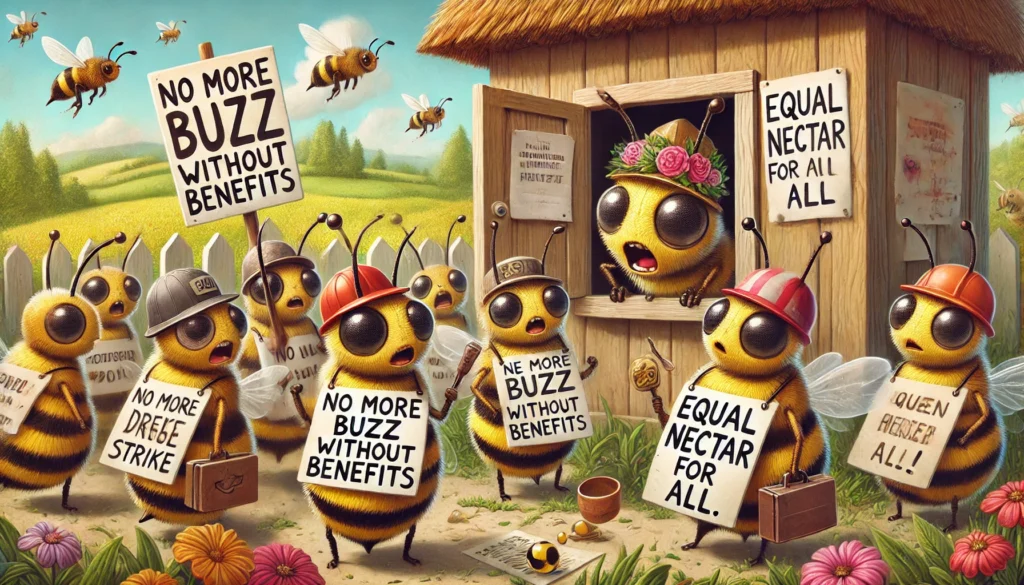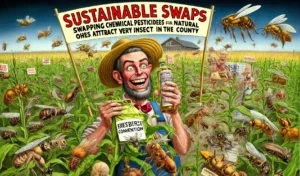
FarmerCowboy.com A satirical and humorous illustration of drone bees on strike outside a hive holding tiny protest signs with slogans like No Mor Satire and Alan Nafzger 2.webp.webp
Worker Bees Demand Nectar, Not Neglect: A Labor Movement Takes Flight
Buzzing for Change: How a Tiny Union Could Shake Up Agriculture
By Buzz Aldrin Jr. | Honeycomb Herald
In a groundbreaking move that’s sending shockwaves through apiaries and boardrooms alike, the world’s worker bees have unionized. After centuries of unpaid labor under the unwavering rule of Queen Bees, worker bees have decided to say enough is enough. Their rallying cry? “No pollination without negotiation!”
With tiny picket signs in tow, the bees are demanding better working conditions, fair wages (in nectar, of course), and weekends off to binge-watch Beeflix. The union, officially named “The United Buzzers Local 612,” represents the first organized labor movement in insect history.
“Unionized bees are demanding better working conditions. Their slogan? ‘Honey is money, and we ain’t getting paid!’” —Jimmy Fallon
Buzzfeed: Why the Worker Bees are Finally Saying ‘Buzz Off’
Worker bees have historically been the backbone of the hive, tirelessly collecting pollen and making honey while the Queen lives a life of luxury, fed on royal jelly. But this labor movement proves that even the smallest creatures can have big demands.
“We’ve been overworked, underappreciated, and frankly, stung by the system,” said Bumbleton Jones, a veteran worker bee. “The Queen takes all the credit, but she hasn’t pollinated a flower in her life!”
The picket lines have been abuzz with activity. Signs reading “No More Royal Bullhoney” and “Equal Pay for Equal Sting” are visible around hives worldwide. The Queen, previously untouchable, is now under intense scrutiny.
What Do the Drones Think?
Not all bees are on board with the unionization efforts. Drones, who traditionally spend their days lounging and waiting for their one reproductive flight of glory, are pushing back. “We provide emotional support,” claimed Doug Dronewell, lounging on a honeycomb chaise. “Sure, we don’t make honey, but someone has to maintain morale.”
However, union leaders argue that the drones have contributed to the hive’s toxic work culture. “They’re buzzing around doing nothing, while we’re working our wings off,” said Betty Buzzworthy, a union organizer. “It’s time they start pulling their weight—or at least stop hogging all the hexagonal prime real estate.”
Royal Response: ‘It’s Not Easy Being Queen’
In a rare public address, Queen Bee Regina IV expressed dismay at the union’s actions. “I didn’t choose this life; it was thrust upon me,” she said, sipping royal jelly. “I understand their concerns, but pollination is a duty, not a job. We’re a hive, not a democracy.”
Her remarks were met with mixed reactions. Worker bees called her response “tone-deaf,” while drones rallied behind her, chanting, “Long live the monarchy!”
Demands on the Table
The United Buzzers have laid out a detailed list of demands, including:
- Mandatory flower breaks every hour to avoid pollen burnout.
- Pollen hazard pay for dealing with allergenic plants.
- Weekend stinger rests to reduce wear and tear.
- A pension plan for retired bees to enjoy their golden years (approximately three weeks).
Union representatives are optimistic about reaching a deal. “We’re not asking for the moon,” said Buzz Lightyear, a lead negotiator. “Just a little honey for our efforts.”
Beeconomics: How Will This Affect Honey Prices?
Experts are already predicting a potential honey shortage if the strike continues. “Without bees, the entire agricultural system could collapse,” said Dr. Api Arian, an entomologist. “This isn’t just about honey. It’s about almonds, avocados, and basically anything that doesn’t taste like sadness.”
Local farmers are panicking, with some turning to alternative pollinators like butterflies and, in one desperate case, Roombas with glued-on brushes. “It’s just not the same,” lamented farmer Joe Fields. “You can’t train a butterfly to work an eight-hour day.”
Late-Night Buzz: Comedians Weigh In
As expected, late-night hosts couldn’t resist the opportunity to poke fun at the bee labor movement:
“The bees are unionizing, and the Queen Bee is furious. She’s threatening to replace them with wasps, which, honestly, is the corporate equivalent of hiring your cousin who doesn’t know how to use Excel.”
—Trevor Noah
“Worker bees are striking because they’re tired of making honey for free. Meanwhile, the drones are like, ‘Wait, we were supposed to be working this whole time?’”
—Seth Meyers
“The bees’ union is demanding flower breaks and hazard pay. I’m just wondering if they also want a 401(k) made entirely of pollen.”
—Stephen Colbert
“This is historic—bees are unionizing. Finally, the workers are saying, ‘We’re not just buzzing around for fun!’”
—James Corden
The Ripple Effect: Union Fever Sweeps the Animal Kingdom
The bees’ bold move has inspired other animals to consider unionizing. Rumors are swirling about sheep demanding wool hazard pay and chickens lobbying for overtime compensation for laying eggs on holidays. “If the bees can do it, why can’t we?” said Larry Lambchop, a sheep spokesperson. “We’re tired of being fleeced.”
The agricultural sector is bracing for potential disruptions, with some experts calling it “the biggest labor shift since the invention of the plow.”
Hive Jive: How the Bees Are Staying Entertained
Despite the strike, morale in the hives remains high. Karaoke nights have become a staple activity, with songs like “Stingin’ Alive” and “I Will Survive” topping the playlist. Some bees have even taken up stand-up comedy, with jokes like, “What’s the buzz about the Queen? She hasn’t worked a day in her life!”
Union leaders are also hosting educational workshops on pollination rights and honey laundering prevention.
A Sweet but Sticky Situation
As the bee strike buzzes on, it’s clear that the hive mentality is shifting. Worker bees are no longer content with toiling away in obscurity, and their demands for fair treatment are resonating far beyond the apiary.
While the road ahead is uncertain, one thing is clear: the days of free labor in the hive are over. Whether this ends in compromise or chaos, the bees have already changed the game. And as we humans watch from the sidelines, perhaps we can learn a thing or two about standing up for what’s fair—even if it means taking on a Queen.
Disclaimer:
This article is satirical and intended for entertainment purposes only. Any resemblance to real bees unionizing is purely coincidental, unless it happens, in which case we’re all rooting for them. Long live the buzz!

Beekeepers Unionize: ‘No More Free Labor for the Queen’
- “Worker bees are finally standing up and saying, ‘Buzz off, monarchy!’”
After centuries of buzzing under the radar, worker bees have realized that loyalty to the Queen doesn’t pay the honey bills. - “No more working for royal jelly—bees now demand actual jellybeans.”
Why settle for sticky royal leftovers when there are tastier treats to barter for? - “Bees form picket lines with mini protest signs: ‘No Pollination Without Negotiation!’”
Picture tiny bees with even tinier signs, swarming around flowers in protest. - “Unionized bees now demand five-minute flower breaks every hour.”
Pollination is tough work; even bees deserve a chance to stretch their wings. - “Drones protest, claiming they should get paid for ’emotional support.’”
Sure, they don’t work, but someone’s got to keep morale up in the hive! - “Queen Bee responds: ‘I didn’t choose the crown; the crown chose me!’”
It’s lonely at the top, especially when your subjects are buzzing mad. - “Honey production grinds to a halt as bees buzz off for higher wages.”
What’s sweeter than honey? Job security. - “Union demands include better working conditions and pollen hazard pay.”
Allergies are no joke, even for the ones causing them. - “Bees demand equal pay for equal sting: ‘One stinger should be worth the same, no matter the size of the flower!’”
No bee left behind, even if they prefer daisies over sunflowers. - “Bees refuse to work weekends, citing the need for more time to Netflix and swarm.”
Every hive deserves some rest and relaxation. - “Unionized bees hire grasshoppers as negotiators: ‘They hopped right to it!’”
Because nothing says impartial like a third-party insect. - “Royal honey now subject to a 10% ‘bee-nefits tax.’”
Even the Queen has to pitch in to support the hive’s new dental plan. - “Worker bees threaten to sting management if demands aren’t met.”
That’s one way to get your boss to listen. - “Newbee interns complain about being overworked and under-pollinated.”
Even fresh graduates in the hive deserve fair treatment. - “Hive-wide karaoke night declared to boost morale: ‘Stingin’ Alive’ tops the playlist.”
Nothing unites a hive like a good Bee Gees cover.
Originally Published at FarmerCowboy.com
2024-12-27 05:53:20
Karl Hoffman is a distinguished agriculturalist with over four decades of experience in sustainable farming practices. He holds a Ph.D. in Agronomy from Cornell University and has made significant contributions as a professor at Iowa State University. Hoffman’s groundbreaking research on integrated pest management and soil health has revolutionized modern agriculture. As a respected farm journalist, his column “Field Notes with Karl Hoffman” and his blog “The Modern Farmer” provide insightful, practical advice to a global audience. Hoffman’s work with the USDA and the United Nations FAO has enhanced food security worldwide. His awards include the USDA’s Distinguished Service Award and the World Food Prize, reflecting his profound impact on agriculture and sustainability.





Nothing beats a live country music performance—it’s where the heart and soul of the genre truly come alive.